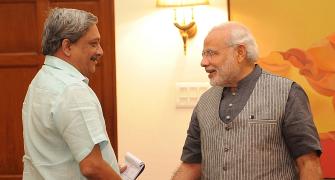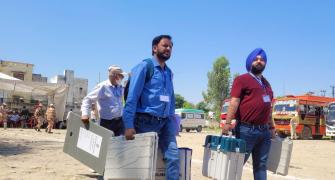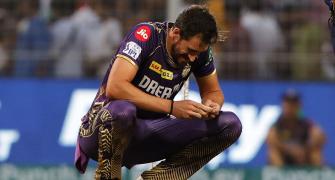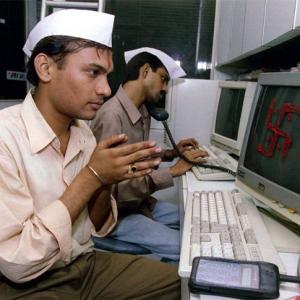
History repeats itself, even of recent vintage: stagnating exports, firming oil prices, a nose-diving rupee, stumbling manufacturing, a crashing Sensex, agrarian distress and logjam in Parliament had all taken up permanent residence on the front pages of the Indian press in 2012 and 2013. They are visiting again -- and for how long, no one knows, says Shreekant Sambrani
That will provide ammunition to the prime minister's critics, whose ranks are swelling as the Modi sarkar approaches its first anniversary. More such instances and arguments will appear in the days to come as proving that the promised achche din are nowhere on the horizon. Government supporters will chant their litany of the achievements of the past year with matching vigour.
This column is not a part of this Mexican stand-off. It explores instead, some key factors underlying the achievements, or the lack thereof, of the new dispensation at the Centre.
No prime minister of India ever had greater experience of running a state than Narendra Modi. His triumphal march to Raisina Hill was propelled by his experience of over a dozen years at the helm of Gujarat.
Some academic questions notwithstanding, the state posted an enviable record of growth and development during his tenure as chief minister -- not just as compared with other large states but with the country as a whole.
He successfully persuaded the nation that this achievement eminently qualified him for the responsibility of leading India out of its trough of economic despondency.
But transiting from the state to the Centre is easier dreamt of than successfully achieved. Five previous prime ministers were also chief ministers. Only one, P V Narasimha Rao, could claim a successful stint in Delhi -- but he had only a short and troubled time in his state long before he became prime minister.
Chief ministers moving to the Centre soon understand that they could exercise far greater powers within their realm but enjoy far fewer degrees of freedom than they do as prime ministers.
They have little wiggle room on policies -- none in foreign and defence matters, and insignificant even in economic affairs. The Centre lays down the boundaries. Modi himself realises this when he stresses cooperative federalism.
The states can only expect to optimise within these parameters. Modi in Gujarat could and did devise strategies that could deliver the best results under the circumstances. He could then legitimately tell potential investors, Indian and foreign, that he was doing the best anyone could under the limits imposed.
And they had ample reason to believe him.
Lately, Modi is being dubbed -- most recently by Arun Shourie -- as an effective project manager, because he was executing that role circumscribed by national policies.
As prime minister, however, he can no longer claim that he is limited by such constraints, because he now has the mandate to circumvent and modify if necessary those very factors that restrained him as chief minister.
To be fair, Modi is aware that he no longer has the alibi that worked for him in Gujarat. That is why he stresses that his government will facilitate rather than hinder. But that needs to be accomplished within a legal framework and not merely by diktats or tinkering with procedures.
This is where the Modi attempt to replicate the Gujarat experience at the Centre runs into trouble. As observed earlier in these pages, India is far removed from the salubrious environment that existed in Gujarat (see Modi's true Gujarat model in practice, Business Standard, August 4, 2014).
All but a handful of Indian states (Gujarat included) have unicameral legislatures. Modi enjoyed brute majorities in successive elections, rendering the legislative agenda a snap.
District panchayats, the next tier of government, are toothless and the bureaucracy is normally only too happy to do the bidding of a popular chief minister. Only Russian President Vladimir Putin enjoys such a position among popularly elected heads of national governments.
Our two Houses of Parliament are no pushovers for Modi's agenda -- certainly not the Rajya Sabha, where the ruling party is in a hopeless minority. State governments have their own priorities not always aligned with those of the Centre.
This is true of some Bharatiya Janata Party governments as well. So to get the job done, what Modi needed was not confrontation but conciliation -- not his strongest suit on current evidence.
The government and the BJP must choose their battles carefully. Just as they cannot win every election they fight, they cannot hope to set right everything all at once. Much to the chagrin of reform hawks, Arvind Subramanian, the government's chief economic advisor, has said that Big Bang reforms were neither required nor possible.The same applies to other policy matters as well. ‘Hasten
slowly’ may well be the mantra for the government, no matter how it delights its critics. As Modi has rightly said and often, he and his government are there for the long haul.
Modi is a quick learner. He demonstrated that abundantly in his Independence Day address, full of ideas and policy initiatives, and undoubtedly the high-water mark of his prime ministership so far. Bravado oratory and slogans may have taken him from Gandhinagar to New Delhi, but only bravura performance can sustain in the long run the hope he has kindled.
The writer taught at Indian Institute of Management, Ahmedabad, and helped set up Institute of Rural Management, Anand











